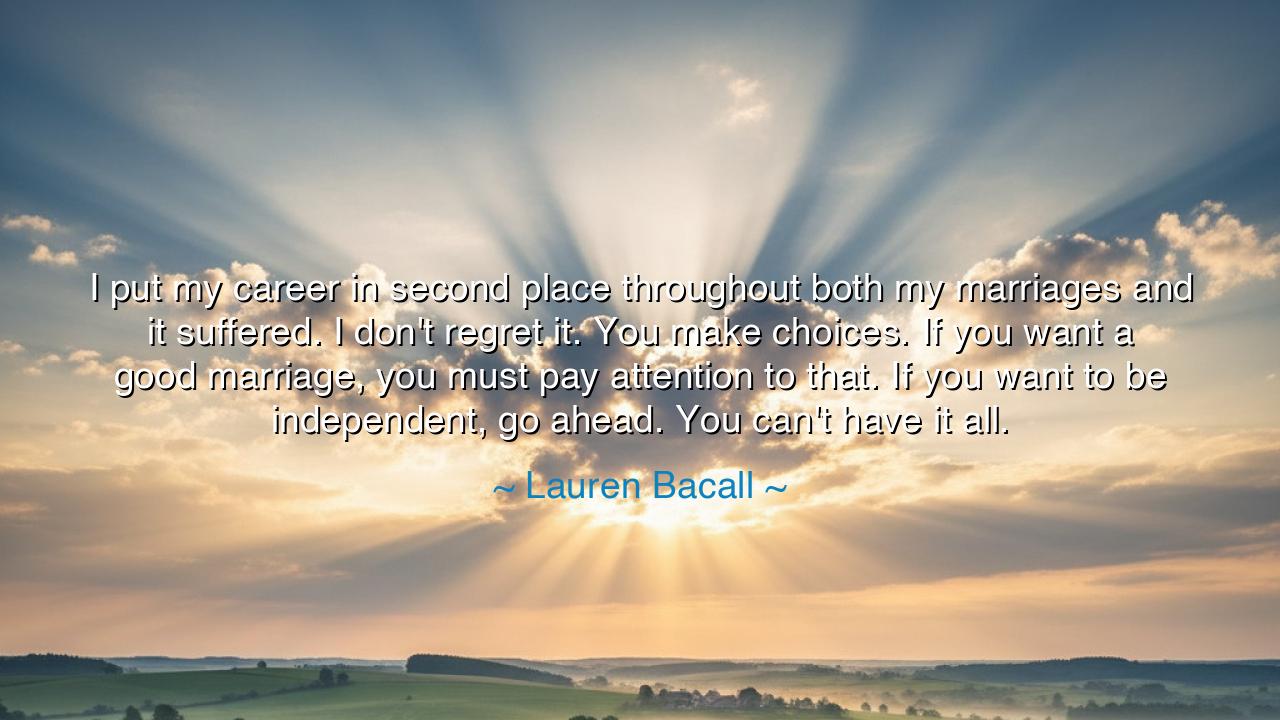
I put my career in second place throughout both my marriages and
I put my career in second place throughout both my marriages and it suffered. I don't regret it. You make choices. If you want a good marriage, you must pay attention to that. If you want to be independent, go ahead. You can't have it all.






The words of Lauren Bacall, spoken with the grace of a woman who had seen both love and loss, ring with the quiet thunder of truth: “I put my career in second place throughout both my marriages and it suffered. I don’t regret it. You make choices. If you want a good marriage, you must pay attention to that. If you want to be independent, go ahead. You can’t have it all.”
Here speaks not the bitterness of sacrifice, but the wisdom of acceptance — the understanding that every path in life demands its price. Bacall, an actress of timeless poise and unyielding spirit, was not lamenting what she had lost, but affirming what she had chosen. For she knew, as the ancients did, that the art of living is not to possess everything, but to choose wisely and love what you choose.
Born into the golden age of Hollywood, Lauren Bacall stood as a symbol of both beauty and strength. Her voice was low and steady, her gaze unwavering — a woman of presence in an age that often asked women to be ornaments. Yet beneath her glamour lay a life of profound humanity. Her marriage to Humphrey Bogart, her great love, was not built on ambition but on devotion. In her words, we hear the echo of that devotion — the decision to place her heart before her fame, her home before her spotlight. In doing so, she revealed a truth often forgotten: that love and ambition, though both noble, are jealous companions. To serve one fully is to accept the other may suffer.
The ancients understood this conflict well. In the myths of old, Artemis chose independence and solitude, swearing never to marry, while Hera, queen of Olympus, chose union and sacrifice. Both were divine, yet neither “had it all.” The gods themselves lived by the rule Bacall uttered — that every choice carries its shadow, and that wisdom lies not in avoiding the shadow, but in embracing it. To expect a life where one can be wholly devoted to love and wholly devoted to self is to chase a mirage. To choose is to live; to refuse to choose is to drift.
Bacall’s words are neither cynical nor resigned; they are clear-eyed and grounded in reality’s rhythm. “You can’t have it all,” she says — not as a denial of possibility, but as an invitation to honesty. For many spend their lives torn between desires, reaching in two directions until the heart itself fractures. She teaches that peace comes when we stop waging war within ourselves and accept that time, energy, and attention are finite. In choosing, we honor the present; in trying to hold everything, we lose even what we have.
Her lesson is not one of surrender but of balance. There are seasons for every soul — seasons for ambition, for creation, for partnership, and for solitude. The tragedy of our age is not that we must choose, but that we are told we should not have to. Yet the truth is older than ambition itself: every great life is built upon trade-offs. The painter who spends her nights at the easel sacrifices sleep and family warmth; the lover who builds a home may sacrifice the boundless freedom of the open road. Both can be noble — if chosen with awareness and without regret.
Think of Cleopatra, who sought to rule and to love, and in her striving for both, brought empires to ruin and her own heart to dust. She was brilliant, daring, and tragic — a queen who wanted the totality of life and found instead its limits. Bacall, in contrast, accepted the limits of her humanity and found serenity. Her wisdom is not the grandeur of conquest, but the serenity of understanding that the heart cannot live in two worlds at once.
So, my child, when you face the crossroads of your own desires — career or companionship, independence or devotion — do not curse the choice before you. Instead, choose with clarity. Choose with love. Know that in choosing one dream, you must release another, and that this is not loss but the sacred price of purpose. Whatever you choose, honor it with your whole being, and do not look back with regret. For as Lauren Bacall knew well, fulfillment does not come from having it all, but from giving your heart wholly to what you hold. Only then can life, though imperfect, shine with the quiet perfection of truth.






AAdministratorAdministrator
Welcome, honored guests. Please leave a comment, we will respond soon